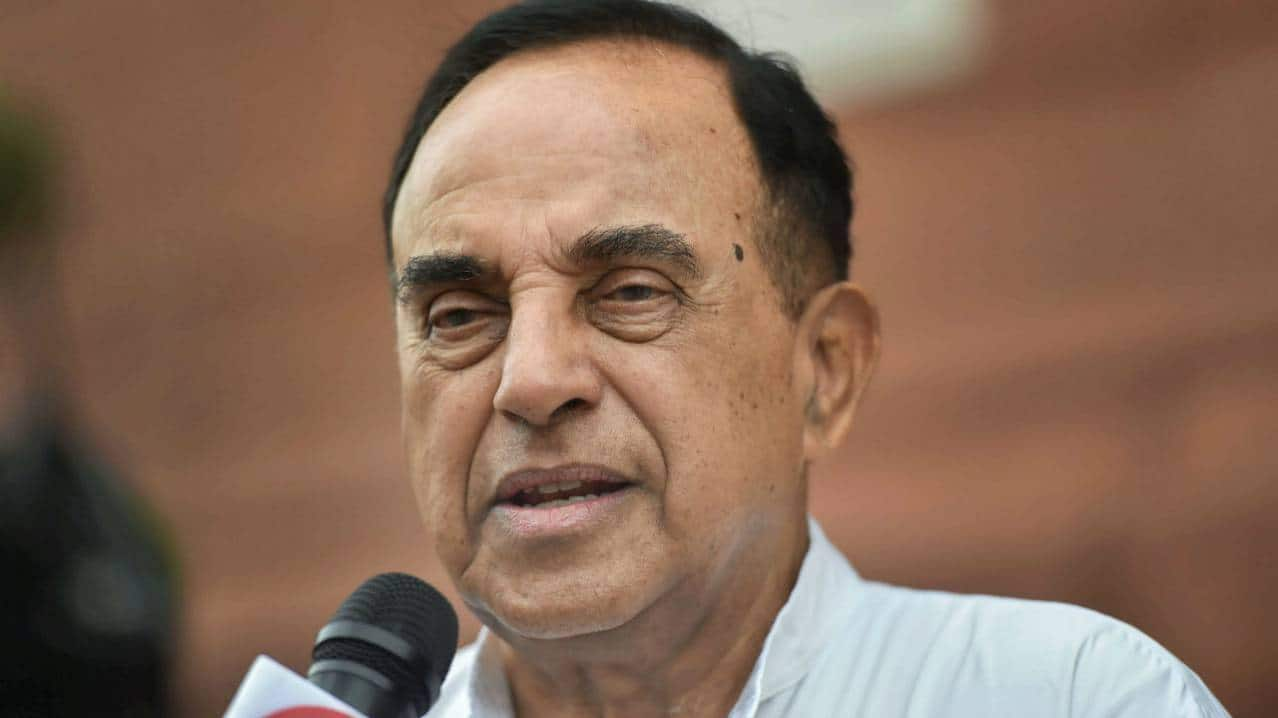




Subramanian Swamy
- Arun Jaitley, Subramanian Swamy spar on Twitter over CEA
On Wednesday, Jaitley had publicly cautioned against the trend of political attacks on persons whose office and discipline constrained them from responding. He was referring to senior BJP leader Subramanian Swamy‘s public attack on the CEA on Twitter calling for his dismissal by labeling him pro-Congress
- Why Swamy toned down his attack on Arvind Subramanian
Party sources said BJP president Amit Shah asked the newly-inducted Rajya Sabha MP to hold his fire against the CEA. It is also likely that senior BJP leaders Rajnath Singh and Nitin Gadkari persuaded Swamy not to embarass the government.
- Subramanian Swamy suspends demand for CEA ouster
Swamy's tweet reads, "If BJP Union govt says that we know all about AS (Arvind Subramanian) but still he is an asset, then I will suspend my demand and wait for events to prove truth."
- Swamy 'undeclared spokesman' of Modi: Cong
Congress on June 22 dubbed Subramanian Swamy as the "undeclared spokesman" of Prime Minister Narendra Modi after the BJP MP targeted Chief Economic Adviser Arvind Subramanian seeking his sacking and asked the PM to "clarify whether the charges levelled are false"
- Swamy's remarks are completely his personal opinion: BJP
BJP said it does not agree with its Rajya Sabha MP Subramanian Swamy's criticism of Chief Economic Adviser Arvind Subramanian and termed it as "completely his personal opinion"
- FM has 'full confidence' in CEA Subramanian
"The government has full confidence in chief economic adviser Arvind Subramanian," Jaitley told a news conference in answer to a reporter's question, adding that his advice had been of "great value".
- Finance Ministry officials defend CEA's appointment
Government had taken a considered view when it appointed the former IMF economist as CEA, sources in the ministry said.
- After Rajan, Subramanian Swamy wants Arvind Subramanian to go
Maverick senior BJP leader Subramanian Swamy tweeted: Modi‘s Chief Economic Adviser Arvind Subramanian had opposed India on IPR till recently. Who said to US Cong on 13/3/13 the US should act against India to defend US Pharmaceuticals interests? Arvind Subramanian MoF!! Sack him !!
- As RBI chief Rajan retreats, his long-time nemesis advances
With the shock retreat from public office of Reserve Bank of India chief comes the rise to international prominence of long-time nemesis Subramanian Swamy, a nationalist named to the upper house of parliament in April by the country's ruling party
- India loses its rockstar central banker: What you need to know
Reserve Bank of India (RBI) chief Raghuram Rajan announced at the weekend that he would not seek a second term when his three-year reign ended in September, and would return to academia instead.
- RBI chief Rajan felt undermined in weeks before quitting:Sources
A newspaper report a week ago that a selection panel would consider a field of candidates rather than directly offer the former IMF chief economist an extension to his three-year term, effectively forcing him to reapply for his own job, may have been the final straw, according to these people and a finance ministry source.
- Rajan's decision a personal choice; we must respect: Kochhar
RBI Governor Raghuram Rajan's decision to not seek a second term is a "personal one" which everybody should respect, ICICI Bank MD & CEO Chanda Kochhar said today.
- Rajan realised he won't get second term: Swamy
BJP MP Subramanian Swamy, who demanded sacking of RBI Governor Raghuram Rajan, today said his decision not to take a second term was good because he has realised he would not get another tenure.
- From intolerance to new GDP numbers, Rajan had a view on all
An outspoken RBI Governor is rarity but Raghuram Rajan is the one who famously declared in James Bond style -- 'My name is Rajan and I do what I do' and he had a candid view on all topical issues economic and political.
- India lost a skillful economic thinker: Amartya on Rajan's exit
Terming RBI Governor Raghuram Rajan's decision not to seek a second term as 'sad' for the country, Nobel laureate Amartya Sen today said India is losing one of the most skillful economic thinkers in the world.
- Opp accuses RSS, BJP ministers of lobbying against Rajan
Congress today accused RSS and some BJP ministers of lobbying against RBI Governor Raghuram Rajan and said his decision not to seek second term was the "most unpleasant thing" for the country.
- Timeline: Countdown to Raghuram Rajan's decision to quit RBI
A look at the timeline of events over the past since the time Subramanian Swamy fired his first salvo against Rajan in a letter to the Prime Minister.
- Raghuram Rajan to quit after tenure ends, return to teaching
Rajan will return to academia when his current term ends on September 4, he said in a message to central bank staff on Saturday.
- GST will be no game-changer: Subramanian Swamy
Swamy also noted that Prime Minister Narendra Modi had objected to the GST when he was the Chief Minister of Gujarat, and now the Tamil Nadu CM J Jayalalitha is objecting to it.
- Swamy for CBI probe into grant of small finance bank licenses
Seeking action against RBI officials, including Governor Raghuram Rajan, the Rajya Sabha MP alleged that the 10 entities that were granted 'in-principle approval' by the Reserve Bank despite their lacking the eligibility criteria as set out in the central bank's guidelines including about foreign holding.














